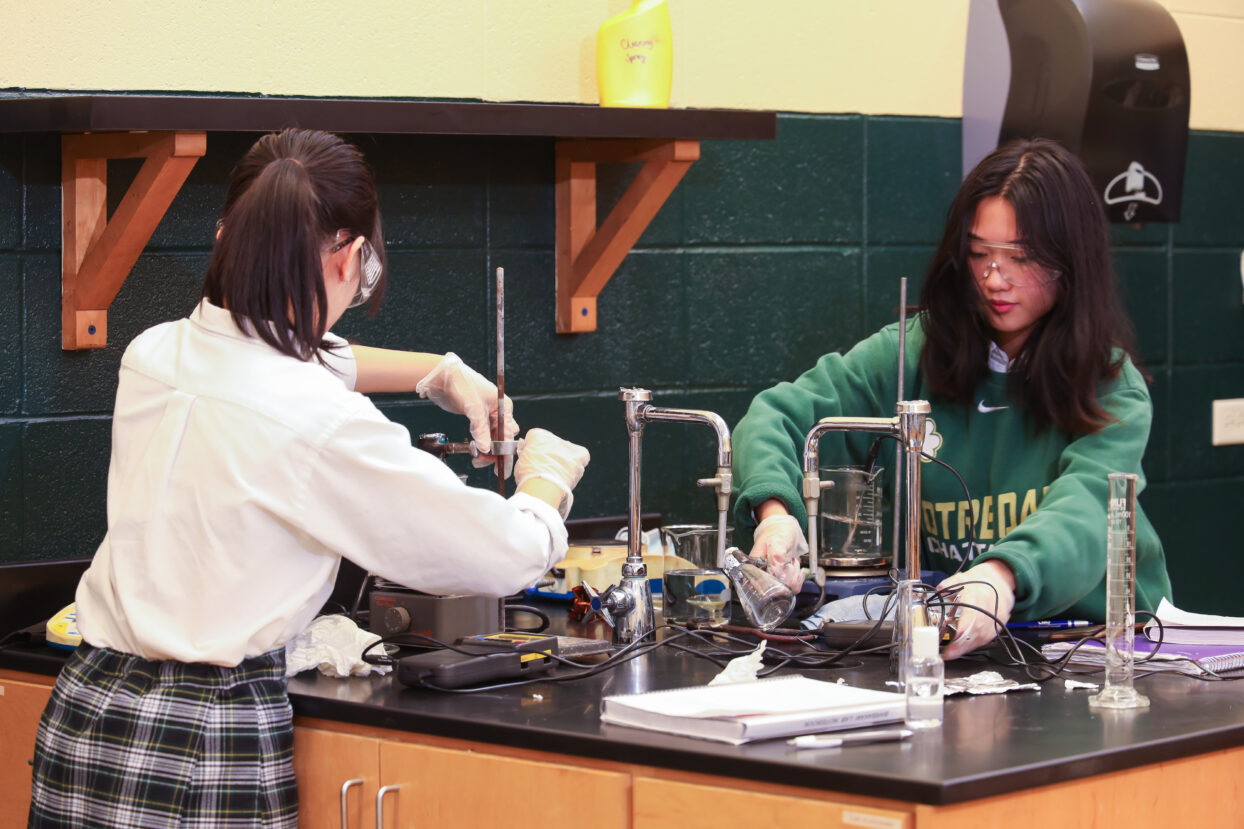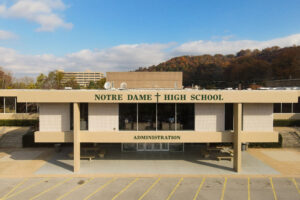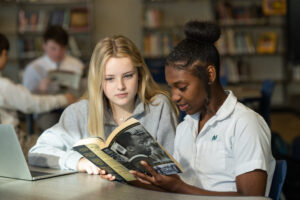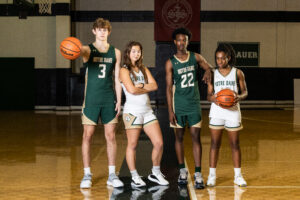Notre Dame High School places priority on student success, facilities upgrades
By Bill Brewer
The body. The mind. The soul. They are the three elements of success at Notre Dame High School.
In addition to its primary ministry of bringing students to Jesus Christ through learning and faith formation, Notre Dame sees its mission as fivefold––academics, athletics, arts, finance, and enrollment––as it works to strengthen its body, mind, and soul.
And Deacon Hicks Armor, who is entering his second year as head of school at Notre Dame, knows there is an appropriate balance that helps the entire school accomplish that mission.
“You have to develop the mind, the body, and the soul. The mind is the classroom. The body is the athletic fields, the gym, the tennis court, the basketball court, the football field, and the lacrosse field. The soul is the Catholicism, the Christian lifestyle that we promote,” Deacon Armor said in giving an update on progress Notre Dame is making in better accomplishing its mission.
Deacon Armor shared a state of Notre Dame High School report as the Diocese of Knoxville’s 10 schools begin the 2023-24 academic year.
Notre Dame also is on a mission to better tell its story in the community, which Deacon Armor believes is critical to the Chattanooga school achieving goals to increase enrollment and development and upgrade facilities.
There is an updated campus strategic plan with a dozen initiatives being readied as the new school year begins. Among the 12 items in the strategic plan are teacher pay, expand some academic and athletic programs, and a new facilities master plan.
Deacon Armor reports that Notre Dame’s leadership has been working to improve the school’s finances––with success. After recording deficits in recent years, the high school recorded a surplus in the 2022-23 school year.
And after enrollment had been declining in recent years, he said 396 students are enrolled for the 2023-24 academic year, with an additional 10 students expected to be in class as the school year gets underway.
In the class of 2023, there were 99 graduates who walked across the stage in May. They are attending 40 different colleges in 14 states, with 90 percent of them receiving merit scholarships valued at $2.3 million, and 86 percent of the class is eligible for the Hope Scholarship.
Deacon Armor is intent on maintaining that upward trajectory through initiatives aimed at attracting new students, communicating the school’s message, focusing on major gifts and planned giving, administration building upgrades, campus enhancements, and athletic facilities upgrades.
“In my mind we have two great challenges: students and money,” he said. “Students bring money, but they don’t bring, in most cases, enough to cover full tuition. So therefore, you have to have money through development. Those two things, on top of a phenomenal faculty, make a school work.”
Work has been underway to increase enrollment, and efforts include making the campus more appealing to prospective students and their parents, expanding and upgrading athletic facilities, and updating academic areas.
Notre Dame also is taking part in the new school choice program the state of Tennessee has extended to Hamilton County. Students in Hamilton County’s public school system are now eligible to transfer to Notre Dame or its diocesan feeder schools, Our Lady of Perpetual Help and St. Jude, and receive tuition assistance to do so.
“I think we have had over the last 13 years a slow decline in enrollment, with some up years, but basically a decline,” Deacon Armor said. “I think it’s imperative that we do partnerships with our grammar schools, Our Lady of Perpetual Help and St. Jude, to increase our enrollment and truly evangelize the faith we believe. Additional students are imperative for us to grow as an institution. So, enrollment is key.”
To that end, Deacon Armor shared that when Bishop Emeritus Richard F. Stika and Deacon Sean Smith, Diocese of Knoxville chancellor, asked him in the spring of 2022 to fill the vacancy of Notre Dame’s leader, he agreed, albeit reluctantly, because his vocational strengths are business management and raising money, not education.
“Out of obedience and friendship to the bishop and Deacon Sean, I said yes. My only confidence was that I didn’t think God would walk away from me. By me saying yes and thinking I don’t know how I’m going to do this, (God) helped me,” he recalled. “If you ask me how my faith journey has been in the last year and a half, and if you ask me if God has talked to me today? No, but He sure gives me people. He certainly helps me out in situations.”
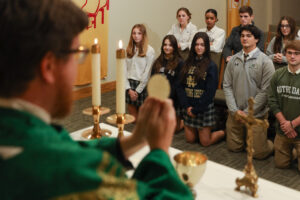 Deacon Armor now knows that God was with him every step of the way and that his early worries about getting the job done were unproductive.
Deacon Armor now knows that God was with him every step of the way and that his early worries about getting the job done were unproductive.
As he occupied an office at Notre Dame, concerned about how he would accomplish objectives for improving the school, he didn’t at first notice that also occupying an office was longtime diocesan educator Jamie Goodhard.
Ms. Goodhard taught English and served as development director at Our Lady of Perpetual Help from 1992-2001 before becoming principal of St. Jude, where she served from 2001-21. She then served as accreditation and special-projects coordinator for Diocese of Knoxville schools from July 2021 to June 2022.
Deacon Armor approached Ms. Goodhard about becoming the assistant head of school, and she agreed. That’s when his prayer for a lead educator was answered.
“People who are professional educators understand better than I the quality of education we have at Notre Dame, and I think that has been an unsung, understated fact. When you look at our honors courses, Advanced Placement courses, and dual-enrollment courses, we have three to five times more than our competitors and almost as many as the top three private schools in Chattanooga,” the deacon said.
Another answered prayer was finding expertise to handle development activities for the high school.
To jumpstart the development process, Deacon Hicks informed Bishop Stika that he needed to raise money, and he wanted to get going first with the Chattanooga-area Catholic churches to convince parishioners “to send me kids or money.” “Bishop Stika said, ‘How can I help you?’”
The Notre Dame graduate asked Bishop Stika to write and sign a letter that he could take to priests in the Chattanooga Deanery allowing him to go into churches to promote Notre Dame and its need for students and donations.
He proceeded to attend Masses, where he would read the Gospel and deliver the homily about Notre Dame. So began the effort to get Notre Dame’s story out into the community.
While visiting St. Thérèse of Lisieux Church in Cleveland, a man introduced himself and offered to help in any way he could. St. Thérèse pastor Father Michael Nolan told Deacon Armor that the man, Carl Rohsenberger, has worked as a development director and special-projects coordinator for United Way of Greater Chattanooga from December 2017 to August 2022. Before joining United Way, Mr. Rohsenberger was a manager in the private sector.
“God sends you people. You have to be humble enough to ask and quiet enough to listen. If you can be humble and quiet––and desperate––He’ll help you,” Deacon Armor said. “Those are just two examples where He has put people in my path.”
He said it wasn’t hard to convince Mr. Rohsenberger and Ms. Goodhard to join him at Notre Dame.
“I think the school academically is there. I haven’t done anything academically (for the school). I’m a businessperson. However, my work is development, admissions, communications, athletics, facilities. I work the non-academic departments. Jamie is the academic person,” Deacon Armor explained. “This model works. And Jamie says we make it work because we have to.”
Deacon Armor praises retired Notre Dame principal George Valadie for his leadership in maintaining and raising Notre Dame’s high academic standards, which is vital to the school’s success.
And that strong academic reputation is critical to the jobs Deacon Armor and Mr. Rohsenberger are doing in reaching out to potential students, their parents, and people who might want to support the school financially.
The deacon, who serves at the Basilica of Sts. Peter and Paul, is passionate about promoting Notre Dame, so persuading families to join the Fighting Irish family and donors to open their checkbooks comes naturally. He began his education at Notre Dame Elementary School and then attended St. Jude School before going to Notre Dame High School. He was in the first class of third-grade students at St. Jude and the first freshman class at Notre Dame when the school relocated. He graduated from Notre Dame in 1970.
He continues to take the message of Chattanooga’s “hidden gem” into the Diocese of Knoxville community, not only because it supports Notre Dame, but it also evangelizes for the Catholic Church in East Tennessee.
“Catholic education sells. … We are supposed to evangelize. Jesus told the Apostles to grow the Church. … We’re supposed to grow the Church. We’re supposed to evangelize. If you can’t catechize, you can’t evangelize. Part of our mission as Catholics is to educate or catechize our youth, and this is the best way to do it,” he said. “I believe it’s something we have to do for our kids. I can do public speaking; I’m a deacon; I can read the Gospel; I went to Catholic schools; I can get up and give personal testimony about this.”
When Deacon Armor has visited churches, he has told congregations that an important part of the Catholic mission is to support Catholic education and that most everyone in the pews has been touched by Catholic education at some time or another.
He also asks parishioners to support Our Lady of Perpetual Help School and St. Jude School.
Notre Dame is having success with its annual fundraising gala that has raised nearly $200,000 for capital improvements, including new campus signage and landscaping and updates to the school’s interior.
Those are just two of several projects the school is launching to improve the campus and its facilities.
“In all of the studies we’ve had for all three schools over the last five to 10 years, one of the things they say is we need curb appeal. We’ve always said if we can get a kid in the front door, once they come in they will see the facilities are good inside, and the culture sells itself. We don’t have bullying. We don’t have cliques. It’s a very family-oriented group,” Deacon Armor said.
“So, if we can get a kid in the front door, nine times out of 10 they’re going to choose us over somebody else. When you drive up to some of our schools, they haven’t been updated. The last study said we need to update the entrance to our facility,” he added. “The gala last year raised a little under $100,000. We’re going to end up spending more than that on campus improvements. The front of the building has been painted. The downstairs has been renovated and updated. The upstairs has been painted. The cafeteria is being upgraded. The chapel is being upgraded. The theater is being updated.”
He said the main administration building will be greatly enhanced from what it has been. The classrooms are nearly 60 years old. And there are plans to upgrade the school gym with a new floor, air conditioning, and painting.
“Once we do that, our main building will be in great shape,” he noted.
Deacon Armor believes the upgrades are needed, but even without them he said Notre Dame’s academic structures compare well with any Chattanooga school.
As that work continues, Notre Dame also has plans for major upgrades to its athletic facilities in addition to the gym.
Deacon Armor explained the importance of updating and expanding the school’s athletic facilities.
“The athletic facilities help us develop the child physically as part of what God calls them to be. Sports teaches leadership, sportsmanship, how to win, how to lose; it teaches you how to compete professionally. Learning how to win and lose in life is a huge lesson. Sports do that,” he noted.
“I’m not a sports junkie myself. I swam competitively in high school. But what sports taught me was how to build friendships, how to participate in a group effort, even though you may be an individual competitor. It also teaches you how to discipline yourself and how to compete against somebody in a professional, Christian way with sportsmanship. I may want to beat you, but it doesn’t mean I’m going to demonize you,” he added. “Competing is a natural thing to do. It’s inherent in what we do. And it’s important that people learn how to compete with sportsmanship and in the proper Christian way. Athletics, even if it’s at the club level or intramurals, are a component part of our own physical development.”
He said another element to athletics’ importance is that other Chattanooga high schools have sports facilities, too, so when students and parents drive onto a high school campus and see a new football stadium, swimming pool, or tennis courts, those are attractions.
“Our competitors probably have better sports facilities than we do because of our limited amount of land. It’s important for us from a curb-appeal standpoint to be able to compete with academic and athletic facilities. I don’t want to be known as a football school, but we need to be able to compete. People want to go to a sports event. People were thrilled when we went to the state championship in basketball this past season. There were three buses and a lot of people driving in cars to see the boys team play in Cookeville. That was great as a morale booster,” Deacon Armor said.
He emphasized that there is a place for sports in education, but it must be kept in check with academics.
He noted that extracurricular activities appeal to a broad spectrum of students, whether in art, music, drama, or academic clubs, and high schools should offer programs to attract the greatest number of students.
He pointed out that the school has revived its marching band, and the updating of the administration building includes new areas where student artwork can be exhibited. The school’s theater, which is part of the facility upgrade, hosts student dramas and musical performances throughout the year.
Notre Dame High School was founded in 1876 by Father Patrick Ryan and the Dominican Sisters of Nashville. Notre Dame, the oldest private high school in Chattanooga, was the first racially integrated high school in Chattanooga. Its current campus in the Glenwood neighborhood near Memorial Hospital was dedicated in 1966.
While that campus is serving the school well, expansion to accommodate student needs isn’t without challenges.
“Our greatest need is land. We essentially have one regulation-size field and that is the football field. And we wear that grass bald. We don’t have practice fields. We have a baseball field that has a little bit of an outfield, but it’s not big enough to do much with,” Deacon Armor observed.
He said the issue of available space has almost reached a critical point as Notre Dame coaches of outdoor sports are simultaneously vying for playing time on limited turf. And the school’s marching band needs room to practice.
Notre Dame has purchased three and a half lots adjacent to the campus to expand the athletic fields. Deacon Armor said the school also is working with the city of Chattanooga on the use of adjacent tennis courts and land next to those tennis courts that may be available.
“Land is the most precious thing to us right now. We just need space,” he said. “One of our strategic initiatives was a facilities master plan. And we went beyond the property we own. We drew a bigger circle and said if we were going to expand, where would we expand to? Past the tennis courts, we own one house, and there are some opportunities to expand down that street. We know where we’re going to expand so that we can keep an eye on things. Now, if we were going to put in a soccer field, we know where we would put it. And if land becomes available there, we know which pieces we want. There are some strategic places we need.”
He noted that plans call for closing off roads on campus and turning them into green spaces, but there will be a need for a service entrance. “We’re trying to do some futuristic planning on acquisitions so that we know that if something comes up how we would use that,” he said.
As Notre Dame continues work to accomplish its goals, Deacon Armor believes the pieces are in place to make those goals reality.
Now what is needed is growth in enrollment and financial support for the school.
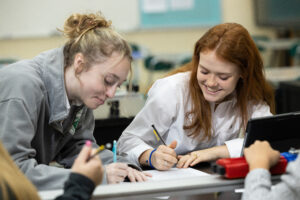 Maintaining academic excellence
Maintaining academic excellence
Notre Dame has the capability for solid financial support, but it has never asked for it, according to Deacon Armor, who pointed out that the cost of providing a Catholic education has skyrocketed, with teacher salaries, facilities maintenance, technology, and all the ancillary expenses putting pressure on any school’s budget.
“We have to obtain and retain quality teachers. The students and the money only come if you have the faculty that can deliver the education. We must produce an education that people will say, ‘I’m willing to pay for that,’” said the deacon, who is convinced that Notre Dame offers the highest-quality education in the Chattanooga area. “Any professional educator who looks at our statistics would say that is one heck of an education that you are producing.”
Those statistics would include grade-point averages, honors classes, dual-enrollment classes, Advanced Placement classes, ACT scores, graduation rate, and college scholarships received.
Deacon Armor points to those performance statistics to show that Notre Dame is on the rise.
Deacon Armor isn’t waiting for professional educators to ask for Notre Dame’s performance report. He is already out front in getting that information to the community. And as the school has been reluctant to actively raise money in the past, he now considers it part of the school’s mission to raise funds for the much-needed improvements.
“For whatever reason, they would never say, ‘Here’s our need,’” he said. “People want to help. Notre Dame’s biggest problem is that it never raised any money. It’s not that the education wasn’t good. It’s not that the tuition was too low. By any national standard, a private school can only charge about 75 percent of the cost of education. If you take what Notre Dame has been short, it’s about 25 percent.”
According to Deacon Armor, some 60 percent of Notre Dame’s students receive tuition assistance. He believes these students wouldn’t have the opportunity for that quality education somewhere else. “We have a 99-percent college-acceptance rate. And a lot of those kids who couldn’t afford to go to high school have a college scholarship today because of Notre Dame. That is about as much of a mission of the Church as there could be,” he said.
As part of Notre Dame’s bold initiatives, there are plans to increase the school’s academic scholarship endowment from $1.2 million to $3.2 million.
The clergyman who for years worked in management for health insurer Blue Cross believes it’s time for Notre Dame to set aside a small part of its Christian humility and sing the school’s praises: a 100-percent graduation rate, 14 courses with dual enrollment that allow students to get college credits, Advanced Placement classes, students who receive appointments to the military academies and entrance into Ivy League colleges, students who receive athletic scholarships, and students with high ACT scores.
“The foundation has always been there, but I think they have not pushed the quality of education that is there. That isn’t anything new. In recent years, the school has been an excellent educational institution,” he said. “I think Notre Dame is almost a hidden gem in education. We have not communicated our strengths and our accomplishments. I think for anybody who is looking for a quality education that is not a public school, then the academics at Notre Dame for the tuition is second to none. A private school, or a Catholic school, is not for everybody. But if you’re looking for a quality education above a public school, you won’t find better value for the money with the type of culture that we have.”
As Deacon Armor preaches the message of Notre Dame High School, he makes sure those listening––Catholic or non-Catholic–– know that faith is what grounds Catholics and Christians in their approach to life and that they understand there is something after this life that they prepare for.
“Not everybody is Catholic in a Catholic school. Those who are other than Catholic appreciate the Christian values and the culture there that is not in a public school. If you don’t have values, you’re not going to value your neighbor or your coworkers. I think students come out of Notre Dame with a value system and appreciation for other humans as equal in God’s creation, and they wouldn’t get that someplace else. We’re having an effect on kids who are other than Catholic,” he said.
He describes a Notre Dame education as “a slight investment for an entire future.”
“I believe parents have an obligation to educate their kids and raise them to be what God wants them to be. I think the best way to do that is in a Catholic school. In the absence of religion or Christian teaching, there is a void of value systems. Catholic schools provide something that we need: values to develop the whole person,” he noted. “All parents, no matter what their socioeconomic position is, want the best for their children.”
“If we want the best for our kids, the best way to get that is quality education––body, mind, and soul––well-rounded with knowledge to succeed in the world. A Catholic education is going to provide parents and their children the best opportunity to be a success in life,” he continued. “I think that God has a special place in His heart for children. He refers to them in the Bible all the time. And I think that He expects us to raise and educate our children to know Him, which is truth and love. I think the best way we can do that is through a Catholic education.”

